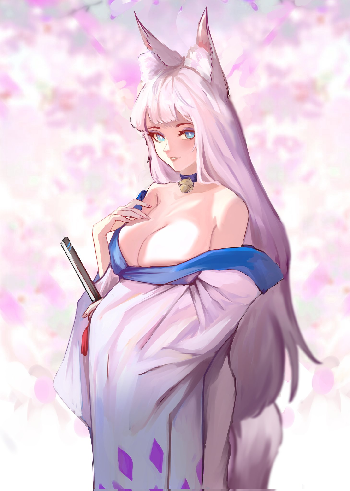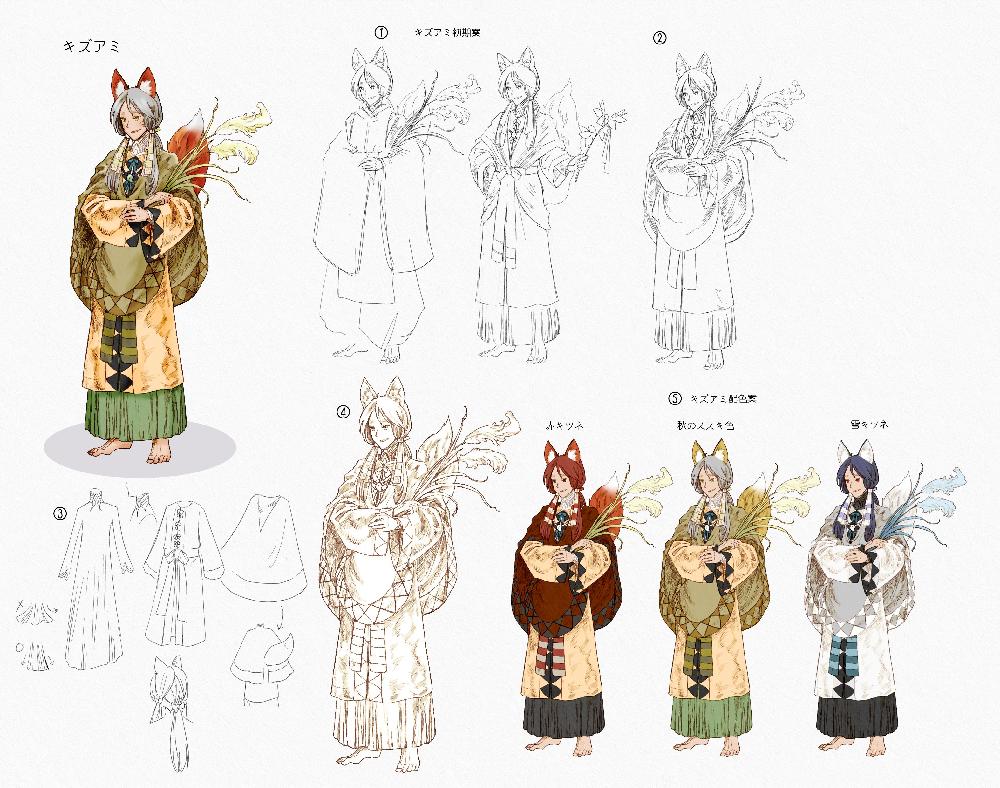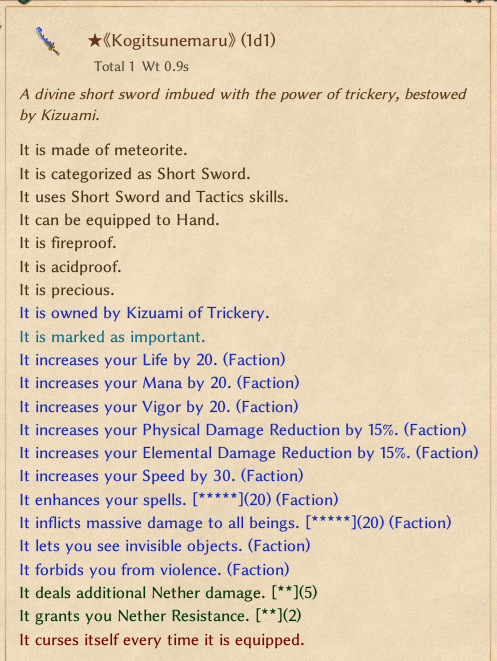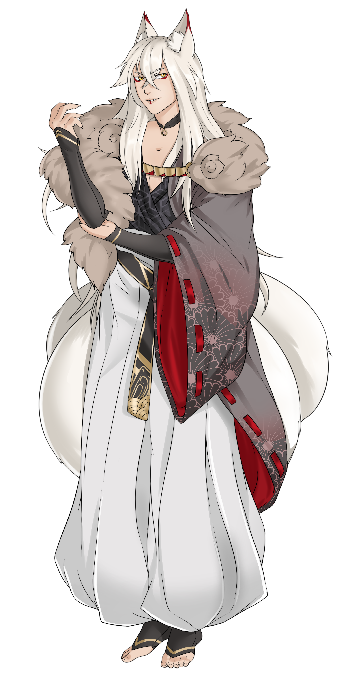Elin:Kizuami of Trickery/Backer Comments
Here are notes on Kizuami from a Kickstarter backer who wished for the Kizuami of Trickery.
Introduction
Hello, fellow Elin players. There's been a trend of people putting down their thoughts about their favourite gods, and I figured that it would be a good time for me to do the same, make an introduction from my perspective. Of course, I can hardly be impartial and this is going to be long-winded, but I'll do my best.
Kizuami of Trickery
So, what's so good about this guy?
Kizuami is a god who's designed for a petmancer playstyle. It's called various things: princess, pokemon trainer, leadership, etc.
The main idea is that the player character doesn't attack directly, and instead forms the back line and buffs allies/debuffs enemies. Whether it's with faithful companions or with disposable summons, the player assumes a support role.
With that in mind, the bonuses become clear: charisma allows the player to acquire more allies, and empowers summoning spells.
Speed and luck let the player react better in the back line to changing situations.
Control magic allows the player to field large parties of allies without fear of friendly fire. As of the beta, the player's control magic is added to that of allies', so Kizuami worshippers can safely field allies such as hounds or shadows.
And finally, memorisation, because constantly buffing an entire party takes a lot of spell stock.
If you're going to be a princess, you need someone to order around, and so the white vixen serves that role as an offensive pet.
And finally, with the god artifact Kogitsunemaru, you dedicate yourself to a support role, removing your ability to deal direct damage in exchange for buffing all your allies considerably.
There's also a yet-unreleased third god ability/gift that I hope will address some of the concerns brought up with the playstyle, but that's in the future!
Because of the quirky nature of his playstyle, when there's talk about Kizuami, it's inevitably polarised. Amongst streamers I've watched and discussions I've read, there are those who dislike him and think his rewards are weak, and there are those who play characters who make good use of it. Both are fine! If you try to appeal to everyone, you end up appealing to no one, but if you emphasise that uniqueness, the charm of your creation may end up appealing to more than your intended audience. Kizuami's playstyle is one that you can't be half-hearted about, and I like that.
History
I've been playing Elona and its variants for several years. Throughout, I noticed two main issues:
*Debuffs had very limited use, because boss-rank monsters had a 75% chance to ignore status effects regardless of any other factors.
*Almost all buffs were limited to the player, resulting in limited means to support allies such as cheer and healing rain.
Because of this and other factors, a petmancer playstyle was difficult. Hence, when the time came to create a god, my mind immediately went to how I could promote a non-healing support playstyle.
Elin has done a lot to make managing a large party easier: having allies automatically equip items and receive supplies from shared containers, for example. Other systems like monster breeding and gene engineering have also greatly increased the strength of allies, indirectly increasing Kizuami's power.
It's been my experience that buffs and debuffs are looked down upon in a number of games, and not unrightly so. After all, "death is the best status effect": in order for a buff or debuff to be worth the time, it needs to be as valuable as dealing damage to the enemy. If you can quickly defeat enemies, then why bother with debuffs? I think that Elin has made great strides in making buffs and debuffs valuable with its complete change from Elona's system, which has allowed Kizuami's playstyle to be viable.
Allies
The core concept of a Kizuami worshipper is reliance on allies. While the downsides of, say, Kogitsunemaru are static, each ally added increases the power of Kizuami's bonuses. It's a fantasy of being a princess with a loyal band of retainers who will fight to the death for her that I want to appeal to. Or perhaps a lich necromancer with an army of undead little sisters. The kind of character where if you fight him, you also have to deal with the legions he commands.
How much more annoying mirage beta is when it immediately summons a swarm of funnels!
It isn't easy, of course. The Kizuami worshipper has to take care of everyone like a big brother: everyone needs to be fed, needs to be equipped, needs to be properly trained to make sure that no one falls behind. It can be a lot to keep track of, and while many party systems are now automated, it can still be overwhelming. Solving the resistance puzzle is annoying enough for one character, but for nine? Ultimately, an army's greatest concern is its logistics; it's been said that the biggest battle for the Kizuami worshipper is in the kitchen. It's not enough to make good food for one person, everyone needs to be fed.
Nor is it for everyone: relying on others to protect you is a choice not everyone is willing to make. Sometimes your army won't act intelligently, sometimes you'll wonder "why did he do that?", sometimes you'll discover that your back line has turned into a front line. By design, both allies and enemies don't act perfectly in combat; there's a degree of uncertainty in every battle that comes from both sides making mistakes that can be exploited. It would be easy to make "perfect" NPC behaviour, but when you think about it, it's also not fun if the enemies act ideally all the time, right?
There's also the psychological effect of making yourself defenseless: sometimes that turn to uncurse yourself and unequip Kogitsunemaru can mean the difference between life and death. Because your contribution to the army isn't as obvious as someone who's up against the enemy, it's possible to feel like you have nothing to do or aren't important.
Being on the back line as support isn't something that's suited for everyone, in which case Kizuami's sister Horome may be a better pick.
About White Vixen

The white vixen is meant to be an offensive attacker to synergise with the Kizuami worshipper. Since the exile is also a magic attacker, I didn't want her to just be a copy of the exile, so she has bolt spells to make her an area of effect attacker instead. The white vixen has less damage on a single target, but she's meant to fire down crowded corridors and into monster houses. The range of a bolt spell is about ten spaces, after all, so if she's properly positioned she can hit many targets at once.
The high mana cost of bolts and other quirks of the white vixen also encourages the player to support her as a Kizuami worshipper; without the player's help, the white vixen can't keep up her offense and quickly runs out of mana.
Later on, I received feedback that she needed some single-target offensive help, but didn't want to give her arrow spells. As a result, she was given the ability to summon bits, which build upon Kizuami's theme and benefit from Kogitsunemaru.
Originally, I thought of calling her "myōbu" to emphasise her nobility and position as a god's messenger, but after receiving feedback that it was too archaic she's now called "white vixen".
Gaining spell experience from cursed equipment is an attempt to make cursed items useful. In Elona, food is often worthless after rotting; Kumiromi's recycle power made useless things useful again.
Similarly, cursed equipment in Elona was very limited in usefulness. While items like scrolls and potions still have inventive uses even when cursed, it's hard to do the same for equipment. Cursed equipment is either quickly sold, or never picked up in the first place. It felt like a big waste, so I wanted to give players a reason to collect these items and turn a curse into a useful blessing. The amount isn't much, but anyone who adventures a lot will end up finding many pieces of cursed equipment over time, so it adds up.
Theming
This is where I go into the reasons behind why Kizuami is the way he is. I'll say up front that everything from here forward isn't objective and might come across as narcissistic and opiniated, so I'll apologise for that. If you're only interested in his game performance, it's ok to stop reading.
Also, it's important to remember that it's all unofficial; the actual background setting is decided by noa. This is just what was going through my head when I came up with Kizuami and discussing things with the Nefu backer.
Ultimately, Kizuami is a two-faced god: he has dominion over blessings and curses, over the elements of heaven and hell. He loves his little sister Horome, but also teases her; if you pray to him, he's just as likely to curse you as he is to bless you. If Kizuami were to have a statue, it'd have a random effect... and the powerful rewards would be just tempting enough to make players risk the punishments.
While the gods of Ylva don't adhere to mortal concepts of good and evil, Kizuami simply hates being bored and is always looking for interesting and unpredictable things: this keeps leading him back to the affairs of mortals. He's like Randy Random from Rimworld in that both your victory or defeat is acceptable, so long as it's interesting. He doesn't even care if you take over his altar, so long as you entertain him enough while doing it: the drama of a single person's life is no less than that of an entire nation, both are equally capable of holding his interest.
On the time scale of the gods, even the existences of long-lived Elea are but embers carried by the wind, and in that small space they experience all seven classical emotions: joy, rage, worry, fear, love, hate, longing. The lives of mortals burn bright in unpredictable ways, and it's this which draws him to skirt dangerously close to what the divine laws permit and forbid, and meddle in their lives as much as he can.
He's the kind of god who will put an obstacle in your way and see how you'll deal with it, hopefully in an interesting manner. Something as simple as his offerings being difficult to obtain has resulted in all kinds of creative solutions from dodo bartender ranches to digging up copper scrap and through a long process ultimately turning it into noodles. I'm sure he's extremely amused by all the people going out onto the sea during winter to collect salt without drowning, hammering bread to get copper noodles, or getting into trouble stealing wheat and rice. The kind of creativity on display in turning Kizuami's curses into blessings by approaching them from a different perspective is the kind that Elona and Elin's high degree of freedom makes possible.
Personality
The seven pillars of Ylva are defined by easily identifiable character archetypes which are easily relatable to players familiar with modern Japanese media. Although there are nuances, after seeing their character designs and hearing some of their lines, you can make correct assumptions about what kind of people the gods are.
In that sense, Kizuami is based on a combination of several character archetypes from otome VNs: a big brother and a prince who hides his mischief behind polite language and mannerisms. He's a two-faced and unpredictable person, so one moment he'll be kind and supportive, then tease and bully you the next. He speaks of of trivialities in extremely formal language, then discusses important matters in an easygoing tone.
You'll get mad and point, saying "you... you...!", then he'll pat you on the head and say how cute you are, and it's impossible to stay genuinely angry after that; he'll sweep you away in another hurricane of emotions and events, experience all the colours of mortal life, and there's no time to dwell on what made you angry in the first place.
Because of this understanding of character archetypes and the expectations they bring, even without seeing the reference image, the game's artist was able to create a character design that's extremely fitting. I'm grateful. Even if it's impossible to compete with his motherly, big-breasted sister in terms of popularity, I've noticed on social media that Kizuami definitely hits the correct demographic, so I'm content.

Relationship with Horome
Working with the Nefu backer to create a comprehensive, unified setting for the fox tribes was one of my fondest experiences during and after the Kickstarter, and developing the relationship that the fox gods have as brother and sister was smooth because we worked well together.
How should I describe it? Imagine that you're just a normal guy, and your little sister has become a famous idol. Everyone loves her gentle way of speaking, her motherly personality, and of course, her enormous chest. She's far more popular than you'll ever be.
But you're the only one who remembers the girl this famous idol used to be, and no matter how much time passes, it's impossible to see your little sister as anything but someone to be protected and teased. He knows that under that calm, motherly demeanor is an easily embarrassed girl who still secretly loves sweets even though she's grown up.
I think that's the kind of relationship they have.
It's not such a bad thing: being a mother to everyone can get tiring. Sometimes it's ok to let yourself be treated like a kid and let someone else be the reliable one, especially when you have to take care of so many children day in, day out.
There's a small story behind one of Kizuami's lines regarding Horome accepting sweets as offerings:
In my original discussions with the Nefu backer, Horome was intended to accept sweets as offerings, but sweets in Elin are divided over different categories of item like egg meal, processed food, cookie, etc. Since gods accept offerings by item categories and there is no "sweets" category, I think that's the reason she accepts rods instead.
As a responsible mother, Horome can't be seen eating sweets all the time, but from Kizuami's perspective she's still his little sister no matter how popular she becomes.
Maybe just a few sweets every now and then?
About Yufu
To be honest, I don't know very much about Yufu. I wanted to be surprised when that part of the setting is revealed, so I decided not to ask noa about the details.
I don't even know whether he's the oldest or youngest of the fox gods. Horome is sad when she speaks about him, and Kizuami won't even acknowledge he ever had this brother.
It's like he was disowned.
But I like to imagine that his body is pinned under the cherry blossom tree in Nefu Village, and the temple is there as a guardian shrine. Do the foxes who live there know its true purpose?
And if his body is there, where did his soul go when it was severed? It's sealed in the rice fields of Mifu Village, of course. The sight of golden rice in a dry paddy ready to be reaped has a different spiritual energy than that of a sacred tree, but both are equally striking.
Of course, this is just what I think; I'm sure noa has better ideas that will be revealed in due time. I get the feeling that if this story were to be told in its full extent, it would be a moving tragedy.
Conclusion
I think that's it for an introduction. Kizuami and the elements of his faith draw strong opinions both good and bad, which I'm happy with. From the perspective of a god of mischief, the question is not "what is the strongest?", "what is the most efficient?", or "what is most morally right?", but rather "what is the most interesting thing that can happen?" It's that philosophy that leads to Kogitsunemaru being the only god artifact to have a serious drawback.
Of course, I would like to express my gratitude to noa and everyone at Lafrontier for releasing such a wonderful game, and for the opportunity to participate in creating the setting.


